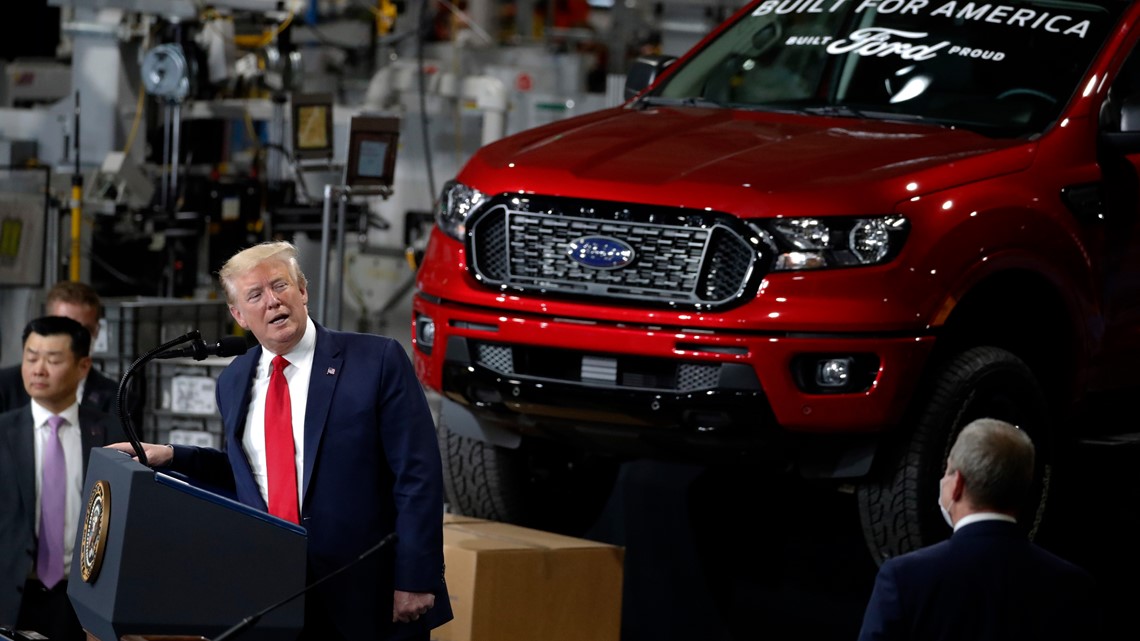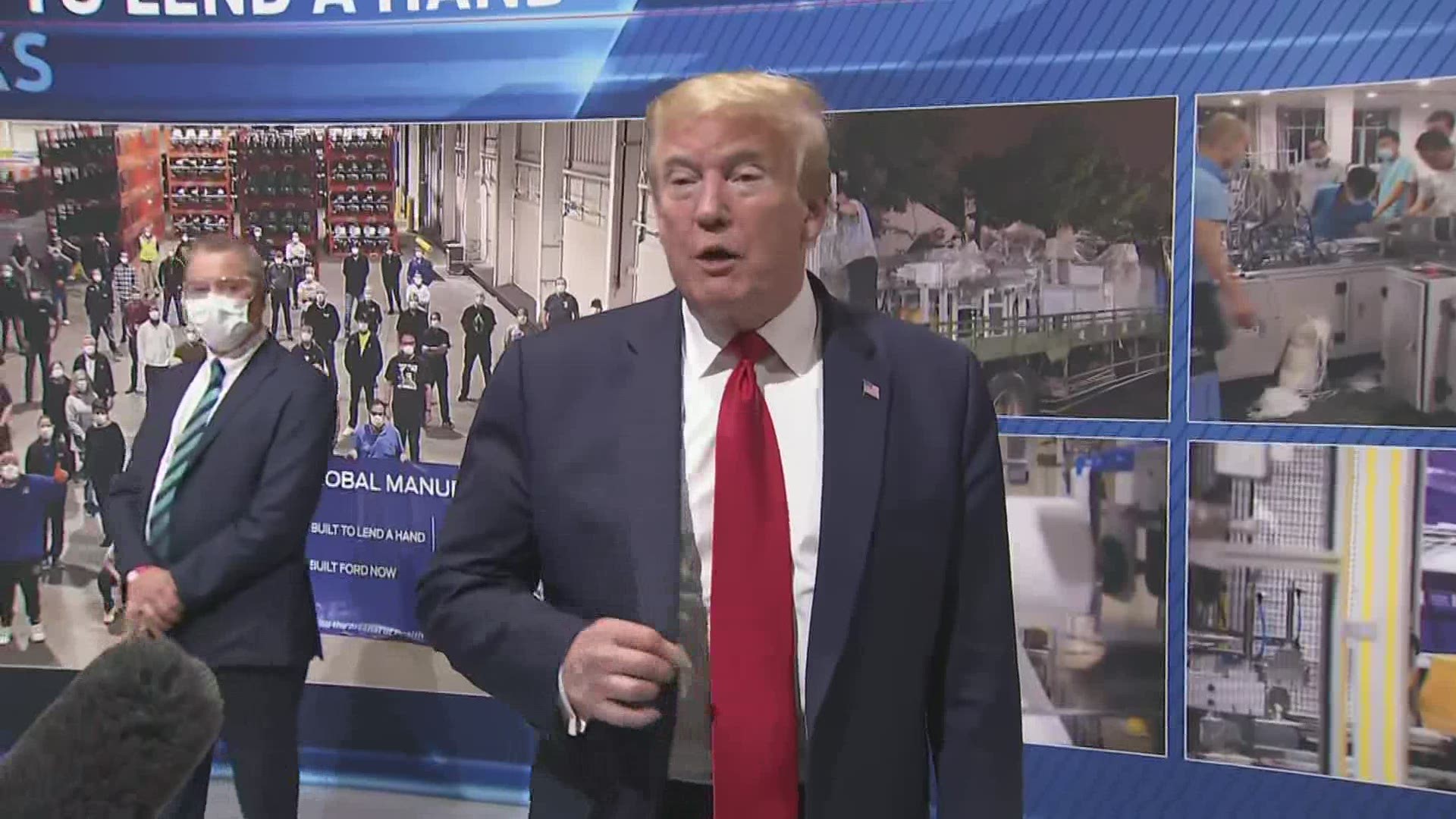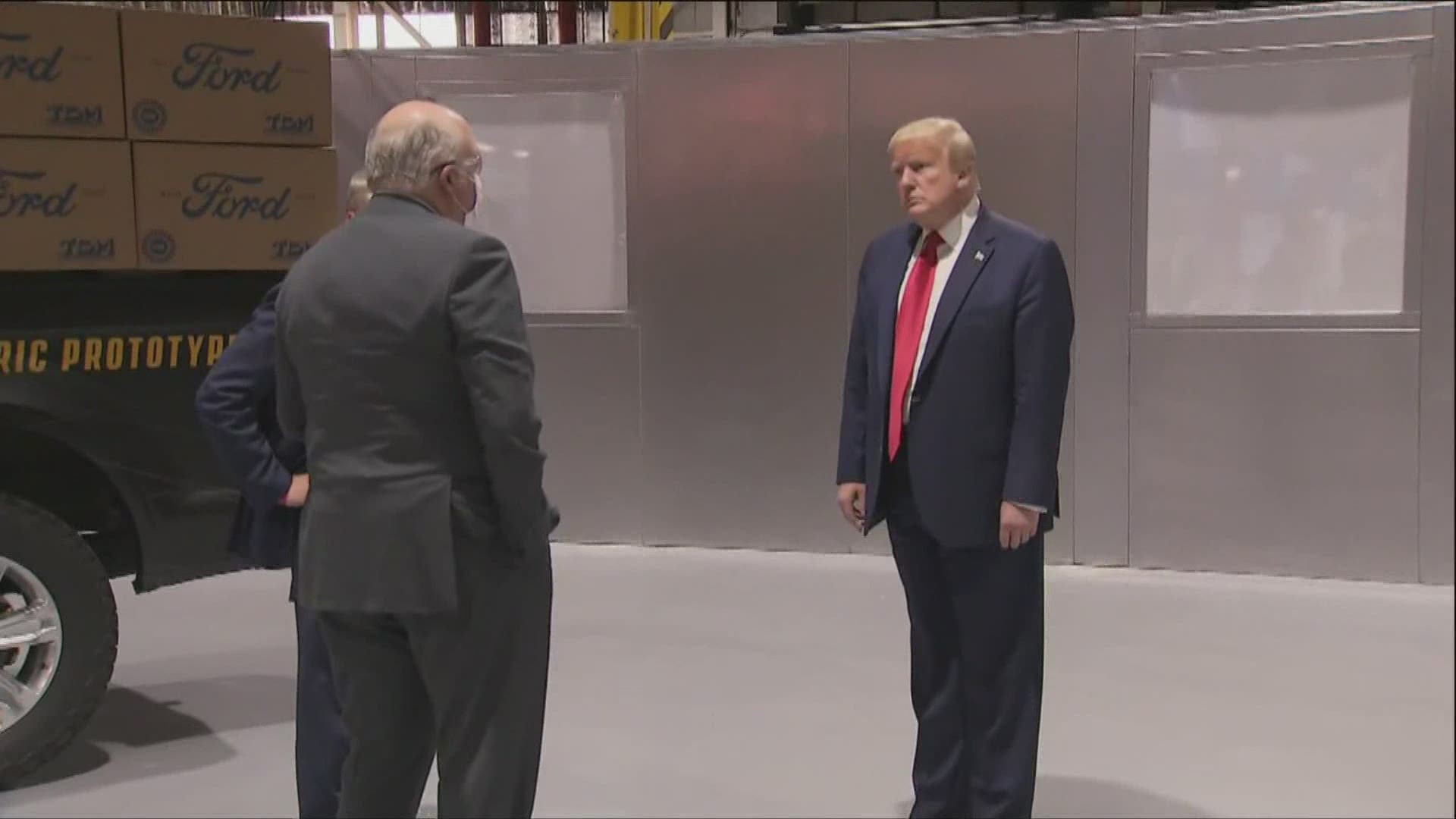YPSILANTI, Mich. — Pandemic politics shadowed President Donald Trump's trip to Michigan on Thursday as he highlighted lifesaving medical devices, with the president and officials from the electoral battleground state clashing over federal aid, mail-in ballots and face masks.
Trump visited Ypsilanti, outside Detroit, to tour a Ford Motor Co. factory that had been repurposed to manufacture ventilators, the medical breathing machines governors begged for during the height of the COVID-19 pandemic.
But his visit came amid a long-running feud with the state's Democratic governor and a day after the president threatened to withhold federal funds over the state's expanded vote-by-mail effort. And, again, the president did not publicly wear a face covering despite a warning from the state's top law enforcement officer that a refusal to do so might lead to a ban on his return.
All of the Ford executives giving Trump the tour were wearings masks, the president standing alone without one. At one point, he did take a White House-branded mask from his pocket and claim to reporters he had worn it elsewhere on the tour, out of public view.
“I did not want to give the press the pleasure of seeing it," Trump said.
For a moment, he also teasingly held up a clear shield in front of his face. A statement from Ford said that Bill Ford, the company's executive chairman, “encouraged President Trump to wear a mask when he arrived" and said the president wore it during “a private viewing of three Ford GTs from over the years" before removing it.
The United Auto Workers union noted in a statement that “some in his entourage'” declined face masks and said “it is vitally important that our members continue to follow the protocols that have been put in place to safeguard them, their families and their communities.”
The UAW also noted Trump's statement that he had just been tested for the virus and said it wanted to make sure he understood the wider “need for an economical instant test that can be administered daily to further protect our members -- and all Americans.”
Michigan Attorney General Dana Nessel said that mask wearing isn’t just Ford’s policy but it’s also the law in a state that’s among those hardest hit by the virus. Nessel said that if Trump refused to wear a mask Thursday “he’s going to be asked not to return to any enclosed facilities inside our state" and “we're going to have to take action” against any company that allows it in the future.
Trump has refused to wear a face mask in public, telling aides he believes it makes him look weak, though it is a practice that federal health authorities say all Americans should adopt to help slow the spread of the virus.
Ford said everyone in its factories must wear personal protective equipment, including masks, and that its policy had been communicated to the White House. At least two people who work in the White House and had been physically close to Trump recently tested positive for the virus.
The Republican president and Gov. Gretchen Whitmer have clashed during the coronavirus outbreak over her criticism of the federal response to the state's needs for medical equipment, like ventilators, and personal protective gear, such as gloves, masks and gowns. Trump on Thursday criticized Democratic governors, suggesting they were proceeding too slowly in reopening their states' economies.
“You have a lot of, unfortunately, in this case Democrat governors (who) think it’s good politics to keep it closed," Trump said. “I think they’re being forced to open, frankly, the people want to get out. You’ll break the country if you don’t."
The day before, Trump threatened to withhold federal funds from Michigan after its secretary of state mailed absentee ballot applications to millions of voters. Trump first tweeted — falsely — that the Democratic state official had mailed absentee ballots to Michigan voters. He later sent a corrected tweet specifying that applications to request absentee ballots had been mailed and seemed to back off his funding threat.
Trump narrowly won Michigan in 2016. He insists mail-in voting is ripe for fraud, although there is scant evidence of wrongdoing.
“We don’t want them to do mail in ballots because it’s going to lead to total election fraud," Trump said Thursday. But then he allowed for some exceptions, including for himself.
“Now, if somebody has to mail it in because they’re sick, or by the way because they live in the White House and they have to vote in Florida and they won’t be in Florida. But there’s a reason for it, that’s OK."
Trying to signal to the nation that life is returning to normal, the president has begun traveling again, with all of his initial trips to states that will be hotly contested in this November’s election. Campaign advisers have grown increasingly worried about Michigan, believing that the president’s attacks on Whitmer have not worked and that the toll the virus has taken in the Detroit area, particularly among African Americans, will prove costly politically.
Trump, at a roundtable with African American supporters in front of a sign with his slogan for reopening the economy, “Transition to Greatness," noted low minority unemployment numbers before the pandemic and also pointed to his administration's work on criminal justice reform.
The president's advisers have become convinced that of the three Rust Belt states that Trump took from Democrats in 2016, Michigan would be much more difficult to win again than Pennsylvania and, especially, Wisconsin.
In the early days of the crisis, Whitmer and other governors and medical workers clamored for ventilators, fearing a shortage of the machines would prove deadly as the virus made breathing difficult for the scores of afflicted patients who were being brought to hospitals.
But the U.S. now has a surplus of the breathing machines, leading Trump to begin describing the U.S. as the “king of ventilators.”
Whitmer did not accompany Trump during the visit.
“We do not have plans to meet, but I did speak with him yesterday on the phone," Whitmer told "CBS This Morning” on Thursday. “I made the case that, you know, we all have to be on the same page here. We’ve got to stop demonizing one another and, really, focus on the fact that the common enemy is the virus.”
___
Lemire reported from New York. Associated Press writers David Eggert in Lansing, Mich. and Zeke Miller in Washington contributed reporting.




